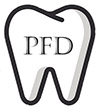Dentures
The term denture refers to a removable tooth replacement, which can be partial or complete. A partial denture, is used when the patient still has some natural teeth. Complete dentures are used when the patient has total tooth loss.
How Dentures are Made
The process of making dentures requires a number of appointments over a few weeks. The dentist will determine which type of dentures are appropriate for the patient and take the following steps:
- Make jaw impressions that can be measured to determine their relationship and the space between them
- Make wax forms, plastic patterns or models that imitate the position and shape of the denture. The patient will try out the models to assess fit, color and the final shape before the permanent denture is made.
- Create the final denture and make adjustments for fit as necessary.
Living with Dentures
Dentures require an adjustment period during which the patient may experience looseness and slippage until the tongue and the cheek muscles get used to holding them in place. Minor soreness and irritation of the gums along with increased saliva flow is normal during this time and will lessen as the mouth gets used to the dentures. Those who wear dentures should use caution while eating hard foods, shells and bones and should avoid gum and sticky foods altogether. Chewing should be done carefully on both sides of the mouth with foods that are cut into small pieces. Patients with new dentures may experience temporary difficulty saying certain words, which will improve with practice.
Benefits of Dentures
Dentures are designed to match the natural teeth and often result in a better smile and fuller facial appearance. They are also very durable if properly cared for through daily removal and cleaning. Having partial or complete dentures is better for long-term oral health than trying to get by with missing teeth.
Dentures are only one option for those who need replacement teeth. Seeing a dentist for a complete evaluation will outline all options available to the patient.

